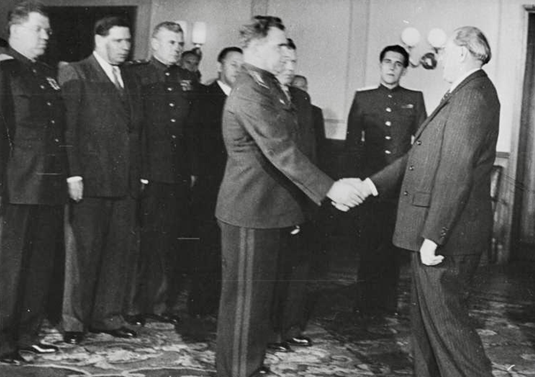Conflict on the Chinese Eastern Railway, 1929
- Maria A. Kithcart

- May 30, 2022
- 2 min read

Pictured: Group of military advisors in China, 1927. V. I. Chuikov is seated third from left, bottom row.
In a previous blog entry, I explored Marshal Chuikov’s studies of the Chinese language and culture through Frunze Military Academy. An accomplished student, Vasily Ivanovich was invited to spend a year of intense study with the Oriental Faculty of Frunze in preparation to be a diplomatic courier and military advisor. Chuikov later traveled to China for the first time in 1926 for a short internship.
During the summer of 1927 after finishing at Frunze, he returned to China for a lengthier stay to serve as a military advisor. On this second eastern business trip, he learned to speak Chinese quite fluently, having traveled almost every corner of North and South China. In 1928, his daughter Ninel (a backward spelling of Lenin) was born in Harbin.
The Chinese Eastern Railway (CER) was the focus of a notorious conflict in 1929, provoked by the Kuomintang military. Marshal Zhang Xueliang attempted to seize the CER, which was built by Russian engineers under Tsar Nicholas II. Vasily Ivanovich detailed the location of the contested railway in Mission to China:
“As you know, almost from Chita (in southeastern Siberia) to Vladivostok, for several thousand kilometers along the Chinese border, the Trans-Baikal Railway stretches. It connects our Far East with the center of the country. Throughout its length, this road in some places passes several kilometers from the Chinese border. In addition, the navigable Amur and Ussuri rivers, which are our natural border with China, link many regions of Transbaikalia and the Soviet Far East as water communications.”
During a raid of the Soviet Consulate General in Harbin on 27 May 1929, the Chinese police arrested 80 people and seized documents. The Special Far Eastern Armies were being formed in Khabarovsk to combat Chinese aggression with the support of Russians and Western powers. Chuikov returned to the Soviet Union via Japan, after which he was sent to Khabarovsk. About this time period, Russian researcher Viktor Gavrilovich wrote the following:
“In 1929, during the CER incident, Chuikov was forced to leave China after the Soviet Union severed diplomatic relations with the Republic of China on 13 July. [Chuikov wrote,] ‘In August 1929, my comrades and I arrived in Vladivostok. On behalf of the headquarters of the Special Far Eastern Army, we were immediately sent to Khabarovsk, where the Special Far Eastern Army was being formed. By that time, an alarming situation had developed on the Soviet-Chinese border, and an armed conflict was brewing.’
Chuikov, who by this time had received the rank of Commander with his Chinese experience, was appointed to the newly created Special Red Banner Far Eastern Army (ODVA) in Khabarovsk as the head of the intelligence department of the headquarters. The Soviet Far Eastern Army defeated Zhang Xueliang's Northeastern Army, and Chuikov participated in the negotiations that restored Soviet control over the CER.”
As a representative of the ODVA headquarters, Chuikov presented the Chinese parliamentarians with the Soviet terms of capitulation. Taking a car owned by the Japanese consulate, Vasily Ivanovich departed for the city of Manchuria to receive the surrender.



